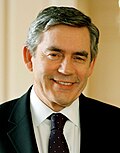References
- "Shadow Cabinet Elections in the 1992 Parliament". Archived from the original on 14 July 2010. Retrieved 24 May 2010.
| ||
| Politics | ||
| Ideology | ||
| General elections | ||
| Party election | ||
| Shadow Cabinet elections | ||
| Post-premiership | ||
| Books | ||
| Related topics | ||
| Family |
| |
| ||
| Politics | ||
| Ideology | ||
| Elections |
| |
| Shadow Cabinet elections | ||
| Publications |
| |
| In the media |
| |
| Family |
| |

